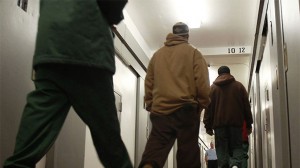
Inmates walk in a cell block at Coxsackie Correctional Facility in Coxsackie, N.Y. (AP Photo/Mike Groll, File)
This week, Kentucky Sen. Rand Paul, who has made some notably clunky efforts to reach out to the African-American community, lamented the fact that one in three black men have been convicted of felonies and called on lawmakers to restore voting rights to ex-convicts who have served their time.
The widespread disenfranchisement of former felons – in a country with the highest incarceration rate in the world – is an issue that has been getting an increasing amount of attention of late. As the prison population has skyrocketed – with the launch of the drug war and the rise of mandatory minimum sentences – so, too has the number of Americans who have served time and now face taxation without any representation.
In the 1960s, the passage of the Voting Rights Act led to a drop in the number of American adults who were disenfranchised. In the 1970s, as the drug warriors gained steam, that trend reversed. According to The Sentencing Project, the disenfranchised population soared from just under 1.2 million in the mid-1970s to almost 6 million in 2010. Of that number, 5.5 million were ex-felons.
In 11 states, you can lose the right to vote permanently following a conviction. And in most states, the ACLU notes that “people with criminal records encounter a variety of other barriers to voting, including, most often, cumbersome restoration processes or lengthy waiting periods before … restoration applications may even be submitted.”
Felony disenfranchisement laws began to crop up in the South after the Civil War as a way to suppress black political power after the passage of the 15th Amendment, which barred overtly racial voting restrictions. They continue to disproportionately affect African-Americans and Latinos. Still, the ratio of black to white incarceration varies significantly from state to state, and the pattern isn’t what one might expect. According to a 2007 analysis of Bureau of Justice statistics by The Sentencing Project, the highest ratios are found in the Midwest – in states such as Iowa and Wisconsin – and in the Northeast — in New Jersey, Vermont and Connecticut. Among the states with the lowest ratios are Georgia, Mississippi and Alabama. (It’s worth noting that all three have high overall incarceration rates and tend to throw an above-average share of their white populations in jail).
This kind of widespread disenfranchisement can have a significant electoral impact. Writing for The American Prospect Jamelle Bouie pointed out that “you can see the effects most clearly in black turnout rates.”
Almost two-thirds [of African Americans]—66 percent—voted in last year’s presidential election, giving African Americans higher turnout than any other racial group. But unlike with other groups, there was an odd gender gap: While more than 70 percent of black women voted, only 60 percent of black men went to the polls. The difference, according to Bernard Fraga of Harvard University, is explained entirely by the huge number of black men who are disenfranchised.
In a 2003 study, sociologists Christopher Uggen at the University Minnesota and Jeff Manza at Northwestern University concluded that during the preceding three decades, seven senate races and one presidential contest – the 2000 election pitting George W. Bush against Al Gore – would likely have gone the other way if not for felony disenfranchisement.
Over the past few years, one silver lining of the deficit hysteria that swept the country’s elites was a new look at prison reform: Jam-packed prisons are costly for both states and the federal government. Last month, Attorney General Eric Holder drew praise from activists when he directed U.S. attorneys to stop charging low-level, non-violent drug offenders with crimes that carry long sentences and proposed a series of additional reforms. But as the Washington Post noted, “some critics said the proposals do not go far enough to begin overhauling a costly and broken law enforcement system.”
In Congress, we have also seen the emergence of a liberal-libertarian coalition that has come together over NSA surveillance and possible airstrikes against Syria. Rand Paul’s comments this week may signal that there is now some new political space for the consideration of serious prison reform, which would mean implementing real drug war reform and giving judges back some discretion by reforming mandated sentences.
Hopefully, it would also entail felon re-enfranchisement. With more than two percent of the adult population barred from the voting booth, its time has certainly come.


